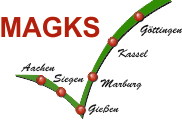Dipl.-Volksw. Katja Popkova

| Katja PopkovaDiplom-VolkswirtinTeaching and Research Assistant, University of Siegen
An economic analysis of the effects of corruption in macro-economic context Corruption
is a multifaceted phenomenon, which has been the object of interdisciplinary research for several
centuries. Philosophers as well as political and legal scientists have been studing
this matter for a long time; however it still remains a rather young research
field in economics. This is explained through the remarkable nature of this
phenomenon: its appearance variety alone complicates the definition of the term;
moreover, its empirical measurability is made difficult through the fact that
corruption activities represent a shadow
economy and can therefore hardly be recorded. Economic research of this issue is so far to a large extent focused on the interrelation between corruption and economic growth, be it carried out by adverse effects for investment, or by decreased efficiency of public expenditures due to corrupt officials, or by misgovernance. Theoretical approaches vary from a concept of corruption as a brake on growth to a “grease the wheels” view, which considers corruption as an efficiency-increasing factor helping to compensate for over-regulated economies. The main objective of my PhD project is to place a particular focus of corruption research on macro-economic performance. It shall be analyzed - in an appropriate theoretical framework and on the basis of the empirical material - which effects for macro-economic processes corruption has and through which transmission mechanisms these effects are generated. The dissertation will examine which guidelines for monetary policy, exchange rate policy, labour market policy, fiscal policy and similar are most efficient in countries with a high level of corruption. The concentration on macro-economy appears to make sense because
| ||||||||||||||||||||||||||||
Working paper | |||||||||||||||||||||||||||||
| |||||||||||||||||||||||||||||
Presentations at conferences and workshops | |||||||||||||||||||||||||||||
| |||||||||||||||||||||||||||||


